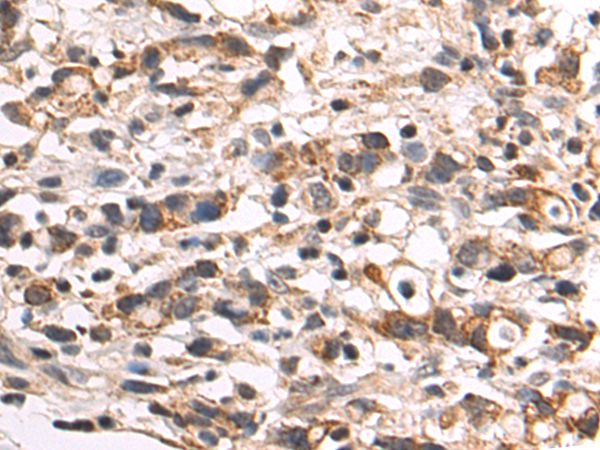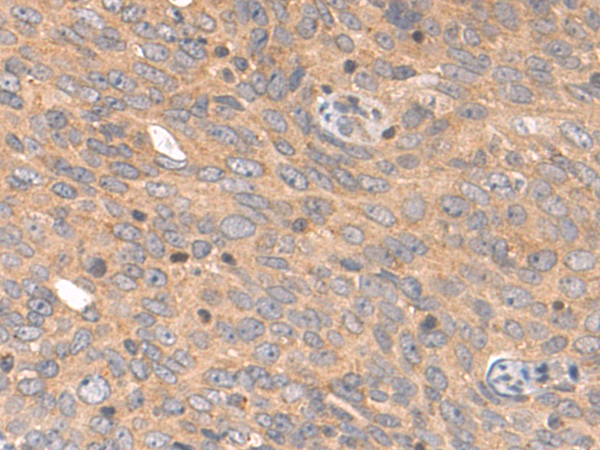

| WB | 咨询技术 | Human,Mouse,Rat |
| IF | 咨询技术 | Human,Mouse,Rat |
| IHC | 1/50-1/200 | Human,Mouse,Rat |
| ICC | 技术咨询 | Human,Mouse,Rat |
| FCM | 咨询技术 | Human,Mouse,Rat |
| Elisa | 1/5000-1/10000 | Human,Mouse,Rat |
| Aliases | NR1I1; PPP1R163 |
| Host/Isotype | Rabbit IgG |
| Antibody Type | Primary antibody |
| Storage | Store at 4°C short term. Aliquot and store at -20°C long term. Avoid freeze/thaw cycles. |
| Species Reactivity | Human, Mouse, Rat |
| Immunogen | Fusion protein of human VDR |
| Formulation | Purified antibody in PBS with 0.05% sodium azide and 50% glycerol. |
+ +
以下是关于VDR抗体的3篇参考文献概览:
---
1. **文献名称**: *"Vitamin D receptor autoantibodies in patients with systemic lupus erythematosus"*
**作者**: Ritterhouse, L.L. et al.
**摘要**: 该研究检测了系统性红斑狼疮(SLE)患者血清中抗维生素D受体(VDR)自身抗体的存在,发现约30%的SLE患者呈阳性。抗体水平与疾病活动度(如肾脏损伤)相关,提示VDR抗体可能通过干扰维生素D信号通路参与SLE发病机制。
---
2. **文献名称**: *"Anti-vitamin D receptor antibodies in type 1 diabetes: a role in beta-cell dysfunction?"*
**作者**: Colin, I.M. et al.
**摘要**: 研究探讨了1型糖尿病患者中VDR抗体的潜在作用,发现部分患者存在针对VDR的自身抗体。实验表明这些抗体可能抑制胰岛β细胞的维生素D依赖性功能,导致胰岛素分泌减少,为1型糖尿病的免疫介导机制提供了新视角。
---
3. **文献名称**: *"Vitamin D receptor antibodies and their functional consequences in autoimmune thyroid disease"*
**作者**: Tiosano, D. et al.
**摘要**: 该文献分析了自身免疫性甲状腺疾病(如桥本甲状腺炎)患者中VDR抗体的流行率及影响。研究发现抗体阳性患者的维生素D代谢异常,且与甲状腺过氧化物酶抗体(TPO-Ab)水平呈负相关,提示VDR抗体可能加剧甲状腺组织的炎症反应。
---
4. **文献名称**: *"Autoantibodies to the vitamin D receptor in chronic lymphocytic leukemia"*
**作者**: Wildbaum, G. et al.
**摘要**: 研究首次报道了慢性淋巴细胞白血病(CLL)患者中存在VDR自身抗体,并发现抗体水平与疾病进展相关。体外实验表明,这些抗体可能通过阻断维生素D的抗增殖作用,促进白血病细胞的存活和耐药性。
---
以上文献均聚焦于VDR抗体的病理生理意义,涵盖自身免疫疾病与肿瘤领域,揭示了其在疾病诊断或治疗中的潜在价值。
**Background of VDR Antibodies**
The vitamin D receptor (VDR) is a nuclear hormone receptor that mediates the genomic effects of vitamin D, regulating calcium homeostasis, bone metabolism, and immune function. VDR antibodies are autoantibodies targeting this receptor, often implicated in autoimmune disorders. Initially identified in studies of hypocalcemic disorders, these antibodies can interfere with VDR signaling, leading to vitamin D resistance and related pathologies.
VDR antibodies are most notably associated with autoimmune diseases such as systemic lupus erythematosus (SLE) and rheumatoid arthritis, where dysregulated immune responses may trigger their production. They disrupt vitamin D’s anti-inflammatory and immunomodulatory roles, exacerbating disease progression. In rare cases, VDR antibodies are linked to hereditary vitamin D-resistant rickets (HVDRR), a condition characterized by impaired bone mineralization despite normal vitamin D levels.
Clinically, detection of VDR antibodies aids in diagnosing autoimmune or resistance syndromes, often via ELISA or cell-based assays. Research also explores their role in chronic kidney disease, cancer, and infectious diseases, where altered VDR signaling may influence outcomes. Therapeutic strategies targeting these antibodies remain experimental, though immunosuppressants or vitamin D analogs are sometimes used to mitigate effects.
Overall, VDR antibodies represent a critical intersection of autoimmunity and endocrine dysfunction, offering insights into personalized treatment approaches for vitamin D-related disorders.
×